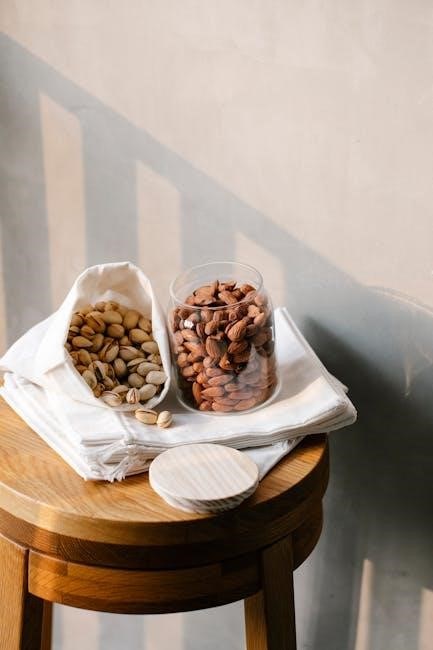The Free Menopause Diet Plan PDF is a comprehensive guide offering structured meal plans, nutritional advice, and recipes to alleviate symptoms and promote overall well-being during menopause.
1.1 Overview of Menopause and the Role of Diet
Menopause is a natural biological process that brings physical and emotional changes, often accompanied by symptoms like weight gain, hot flashes, and bone density loss. Diet plays a crucial role in managing these symptoms and promoting long-term health. A balanced diet rich in nutrients can help stabilize hormones, improve energy levels, and support bone health. Incorporating foods high in calcium, omega-3s, and fiber, while reducing processed sugars, can significantly alleviate menopause-related discomfort and enhance overall well-being.
1.2 Benefits of a Structured Meal Plan for Menopause
A structured meal plan provides clear guidance, ensuring balanced nutrition and symptom relief during menopause. It helps manage weight, improves energy levels, and supports bone health. By incorporating anti-inflammatory foods, the plan reduces hot flashes and joint pain. It also promotes gut health and hormone balance, offering a sustainable approach to long-term well-being. A structured plan simplifies meal decisions, saving time and reducing stress, while fostering healthier eating habits for menopause and beyond.

Key Components of a Menopause Diet Plan
A menopause diet plan emphasizes nutrient-dense foods, hormone-balancing ingredients, and anti-inflammatory options to support overall health and symptom relief during this transitional phase.
2.1 Nutrient-Dense Foods for Hormone Balance
A menopause diet rich in nutrient-dense foods supports hormone balance and overall well-being. Include leafy greens for calcium and magnesium, berries for antioxidants, and whole grains for fiber. Lean proteins, such as fish and poultry, along with healthy fats like avocados and nuts, provide essential nutrients. These foods help stabilize hormones, improve metabolism, and reduce inflammation, making them crucial for managing menopause symptoms and promoting long-term health effectively.
2.2 Incorporating Anti-Inflammatory and Gut-Friendly Foods
Incorporating anti-inflammatory and gut-friendly foods into your menopause diet can significantly reduce symptoms. Focus on omega-3 rich fish like salmon, probiotic sources such as yogurt, and fiber-rich vegetables. These foods help lower inflammation, support gut health, and alleviate common issues like bloating and hot flashes. A balanced intake of these nutrients aids in managing menopause discomfort effectively.
2.3 Importance of Protein, Healthy Fats, and Complex Carbohydrates
Protein, healthy fats, and complex carbohydrates are essential for a balanced menopause diet. Protein supports muscle mass and satiety, while healthy fats aid in hormone production and absorption of vitamins. Complex carbs provide sustained energy and fiber, promoting gut health. These nutrients collectively support weight management, bone health, and overall well-being, making them crucial for managing menopause symptoms and maintaining long-term health.
Sample 7-Day Meal Plan for Menopause
A structured 7-day meal plan offering balanced nutrition to alleviate menopause symptoms. Includes daily breakfast, lunch, dinner, snacks, and beverage options to support energy and overall well-being.
3.1 Breakfast, Lunch, and Dinner Options for Each Day
Start your day with oatmeal topped with fresh berries and flaxseeds for omega-3s. Lunch features quinoa salad with colorful vegetables and chickpeas. Dinner includes grilled chicken or fish with steamed greens. Snacks like nuts or Greek yogurt keep energy levels steady. Each meal is designed to balance blood sugar, support hormone health, and reduce inflammation. The plan emphasizes protein, healthy fats, and complex carbs for sustained energy and overall well-being during menopause.
3.2 Snack Ideas and Beverage Recommendations
Snacks like mixed nuts, seeds, fresh fruit, and Greek yogurt with honey provide sustained energy. Herbal teas, green tea, and water are excellent beverage choices. Incorporate hydrating options like cucumber water or coconut water; Avoid sugary drinks and excessive caffeine. These snacks and beverages support blood sugar balance, reduce cravings, and aid in maintaining a healthy metabolism. They also promote hydration and overall well-being during menopause.

Special Dietary Considerations
Addressing dietary needs like gluten-free and vegan options ensures inclusivity. Prioritizing calcium-rich foods supports bone health, while mindful choices help manage menopause symptoms effectively and sustainably.
4.1 Gluten-Free and Vegan Options
The Free Menopause Diet Plan PDF includes gluten-free and vegan options, ensuring inclusivity for all dietary preferences. These options focus on whole, nutrient-dense foods like quinoa, brown rice, and leafy greens, which support hormone balance and overall health. The plan avoids inflammatory ingredients, offering alternatives to traditional recipes. Vegan-friendly proteins such as chickpeas, lentils, and tofu are highlighted, along with plant-based sources of calcium. This approach ensures that everyone can benefit from a balanced and symptom-relieving diet during menopause.
4.2 Managing Calcium Intake for Bone Health

Maintaining adequate calcium intake is crucial during menopause to support bone health and prevent osteoporosis. The Free Menopause Diet Plan PDF recommends consuming 2-4 servings of calcium-rich foods daily, such as dairy products, leafy greens, and fortified plant-based milk. It also emphasizes the importance of vitamin D for calcium absorption. The guide provides tailored tips to incorporate these nutrients effectively, ensuring bone density is preserved and overall health is maintained during this transitional phase.
Grocery List and Meal Planning Tips
Create a structured grocery list with essential foods like fruits, vegetables, lean proteins, and whole grains. Plan meals in advance to ensure balanced nutrition and portion control.
5.1 Essential Foods to Include in Your Grocery List
Your grocery list should focus on nutrient-dense foods like leafy greens, berries, nuts, seeds, and fatty fish. Include lean proteins, whole grains, and calcium-rich foods for bone health. Add anti-inflammatory options such as turmeric, flaxseeds, and olive oil. Incorporate fermented foods like yogurt and kimchi for gut health. Don’t forget high-fiber vegetables like broccoli and sweet potatoes to support digestion and energy levels. These foods promote hormonal balance and overall well-being during menopause.
5.2 Strategies for Meal Prepping and Portion Control
Plan meals weekly and prepare ingredients in advance to save time and ensure consistency. Use portion-controlled containers to avoid overeating. Measure ingredients carefully and store leftovers for future meals. Incorporate mindful eating practices to prevent emotional snacking. Batch cooking and freezing meals can simplify the process. Stay hydrated and include healthy snacks to maintain energy levels. These strategies help maintain a balanced diet and support long-term health goals during menopause.

Maintaining a Healthy Diet During Menopause
Maintaining a healthy diet during menopause involves balanced nutrition, focusing on anti-inflammatory foods, staying hydrated, and mindful eating. These strategies support symptom relief and energy levels.
6.1 Overcoming Common Challenges
Common challenges during menopause include managing cravings, maintaining consistent meal plans, and dealing with fatigue. Structured meal plans, hydration, and seeking support can help. Prioritize nutrient-dense foods to reduce symptoms like bloating and energy dips. Incorporate anti-inflammatory foods and whole grains to stabilize blood sugar levels. Mindful eating and portion control are key to maintaining a balanced diet. Staying organized with grocery lists and meal prep can simplify the process and ensure long-term success.
6.2 Mindful Eating and Reducing Sugar Intake
Mindful eating promotes awareness of hunger cues, encouraging slower, more intentional meals. Reducing sugar intake helps stabilize blood sugar levels, alleviating energy fluctuations and cravings. Focus on whole, unprocessed foods like vegetables, lean proteins, and whole grains. Avoid hidden sugars in processed foods and opt for natural sweeteners like berries or citrus. The free menopause diet plan PDF provides practical tips to identify hidden sugars and plan balanced, low-sugar meals.

The Role of a Free Menopause Diet Plan PDF
The free menopause diet plan PDF serves as a handy resource, offering structured meal plans, grocery lists, and expert tips to support women through menopause nutritionally.
7.1 Features of a Comprehensive PDF Guide
A comprehensive PDF guide for menopause diets includes detailed weekly meal plans, grocery lists, and simple, nutritious recipes. It often features tips for symptom relief, such as managing hot flashes and weight gain. The guide may also include a fridge planner, nutrient checklist, and strategies for mindful eating. Designed to be user-friendly, it provides a structured approach to nutrition, ensuring balanced hormones and overall well-being during menopause.
7.2 How to Download and Use the PDF Resource
To access the free menopause diet plan PDF, simply click the download link provided on the website. Once downloaded, you’ll find a user-friendly guide with detailed meal plans, recipes, and shopping lists. Use the PDF to plan your meals, track your progress, and explore nutrition tips tailored for menopause. Print or save it for easy reference, ensuring you stay on track with your dietary goals for symptom relief and overall health.
Empower your health with the free menopause diet plan PDF. Manage symptoms, improve well-being, and take control of your nutrition for a balanced future. Download now!
8.1 Summary of Key Takeaways
The free menopause diet plan PDF serves as a valuable resource, offering structured meal plans, nutrient-dense food recommendations, and expert tips to manage symptoms and enhance well-being. Emphasizing anti-inflammatory, gut-friendly, and hormone-balancing foods, it provides practical strategies for weight management, bone health, and overall vitality. With grocery lists, recipes, and mindful eating guidance, this guide empowers women to navigate menopause confidently and sustainably, fostering long-term health benefits.
8.2 Encouragement to Start the Diet Plan
Embrace this transformative opportunity to enhance your health and well-being during menopause. The free PDF guide provides a clear, actionable roadmap to symptom relief and vitality. By incorporating nutrient-dense foods and mindful eating practices, you’ll empower your body to thrive. Start your journey today and take proactive steps toward a balanced, energetic, and healthier you—your well-being deserves it!
